How to Lower Blood Pressure Instantly in an Emergency: Effective Techniques and Immediate Actions
Did you know that in 2021 high blood pressure, also called hypertension, was a primary or contributing cause of almost 700 thousand deaths in the United States alone?
High blood pressure arises when the force of blood against artery walls remains consistently too high, demanding a long-term care strategy. However, if you need immediate relief, we’ve prepared an article about 10 ways to lower blood pressure in just a few minutes.
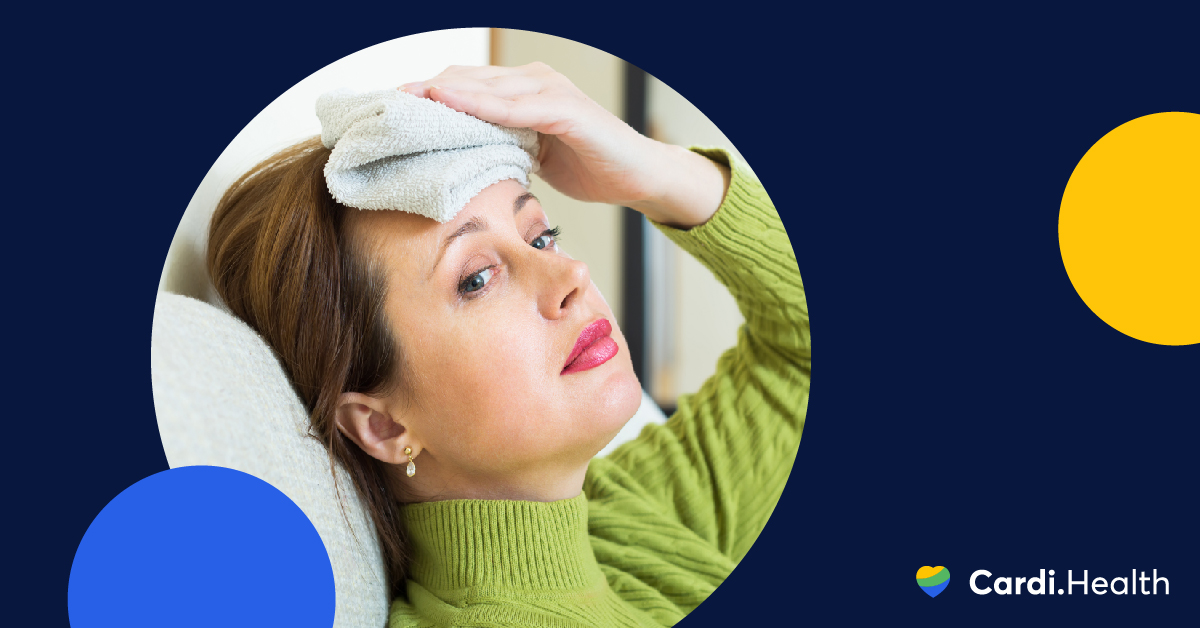
Master your heart health now
Take part in our 60sec quiz and get a heart health plan tailored just for you.
Contents
Recognizing Signs and Symptoms of an Emergency
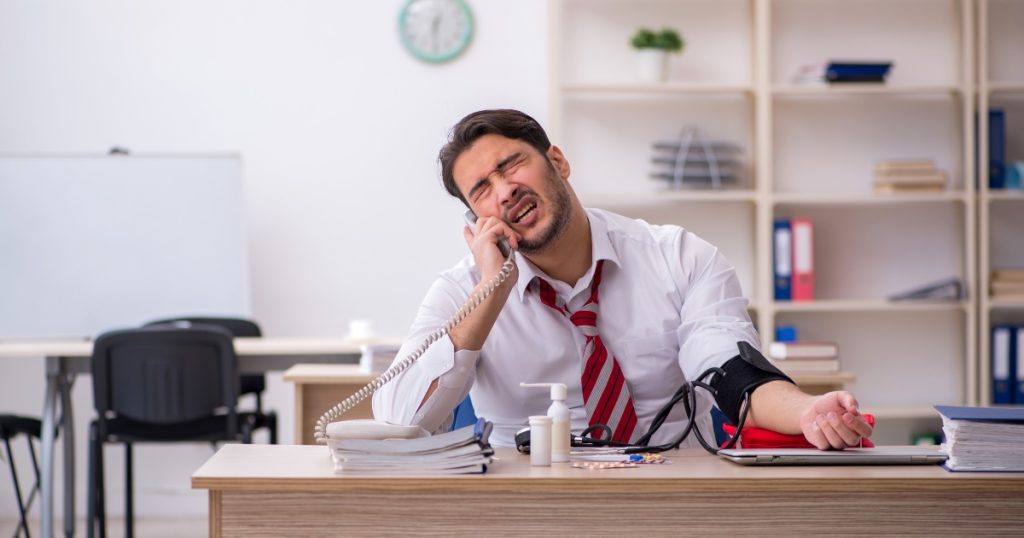
Recognizing the signs and symptoms of emergencies is crucial for timely intervention and proper medical attention. As explained by the American Heart Association, a hypertensive crisis occurs when blood pressure rises to dangerously high levels, 180/120mmHg or greater, and poses an immediate threat to a person’s health. Some common indications of hypertensive crisis include:
- Severe headache: The increased pressure in the blood vessels can lead to an intense, throbbing headache that comes suddenly and persists.
- Severe chest pain: High blood pressure can put excessive strain on the heart and blood vessels, leading to chest pain or angina.
- Shortness of breath: Difficulty breathing or shortness of breath may occur due to the reduced oxygen supply to the lungs caused by high blood pressure in the pulmonary arteries.
- Severe anxiety: Extremely high blood pressure levels can cause feelings of severe anxiety or even panic attacks.
- Seizures: Hypertensive crisis can lead to seizures, as the heightened pressure in the brain may disrupt regular neurological activity.
- Visual changes: Blurred vision or seeing spots may arise due to the impact of high blood pressure on the blood vessels in the eyes.
- Weakness or numbness: Hypertension can affect blood flow to different body parts, leading to weakness or numbness, especially in the arms, legs, or face.
- Altered mental state: High blood pressure can result in confusion, disorientation, or changes in consciousness due to its effect on the brain.
- Nausea and vomiting: Increased pressure on blood vessels can affect the digestive system, causing nausea and vomiting.
- Nosebleeds: Although nosebleeds are not always a direct sign of a hypertensive crisis, they can be a potential indicator, especially when accompanied by other symptoms.
High blood pressure crisis can lead to life-threatening complications, such as stroke, heart disease, or organ damage. If you suspect it, call emergency services or go to the nearest emergency room without delay.
Start managing your heart health now!
Find out what works for you with this 60sec quiz.

10 Immediate Actions for Lowering Blood Pressure Instantly
Here are 10 ways how to lower blood pressure instantly in an emergency:
1. Take deep breaths

Inhale deeply from your core, hold for approximately 2 seconds, then exhale slowly. Pause briefly and repeat.
Deep breathing can temporarily reduce high blood pressure by triggering the relaxation response, improving oxygenation, and reducing anxiety.
2. Sit and rest
If you feel like your blood pressure has risen, sit down and try to rest your body for a few moments.
Sitting and resting helps stabilize blood pressure, conserve energy, and reduce stress. It also allows for better blood flow distribution and increased focus.
3. Elevate legs
Elevating the legs involves raising them above heart level, typically by lying down and propping them on a cushion or elevated surface.
This action aids in improved blood circulation, reducing pressure on blood vessels and assisting the heart in pumping blood more efficiently, which can help lower blood pressure temporarily.
4. Drink water
Drinking a few glasses of water is one of the ways to lower blood pressure immediately.
Maintaining proper hydration is vital. High blood pressure can be exacerbated by dehydration, and drinking water can dilute the blood and reduce its viscosity, making it easier for the heart to pump blood.
5. Reduce muscle tension
Reducing muscle tension involves consciously relaxing muscles throughout the body.
Tense muscles can worsen high blood pressure by increasing stress and anxiety. By relaxing muscles through techniques like progressive muscle relaxation, you can promote a sense of calmness and lower blood pressure.
6. Use cold compresses
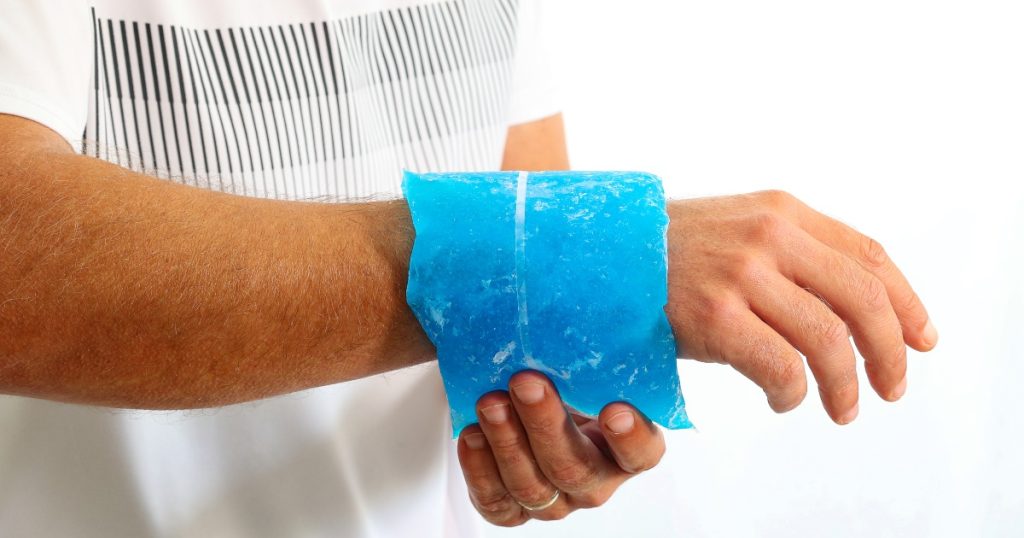
Apply a cloth or ice pack cooled with cold water to certain body areas, such as the forehead, neck, or wrists.
The cold temperature causes the blood vessels to narrow and reduces blood flow to the area. This can help temporarily lower your blood pressure by decreasing the overall volume of blood circulating through the constricted vessels.
7. Try to remain calm
You can calm yourself with deep breathing exercises, talking with people around you, and being mindful of the situation.
By consciously trying to stay calm, you can activate the body’s relaxation response, which can help reduce the release of stress hormones and lower heart rate and blood pressure. Remaining calm also allows you to think more clearly and make informed decisions during an emergency.
8. Practice relaxation exercises
Use techniques like deep breathing, meditation, or progressive muscle relaxation to promote physical and mental calmness.
These exercises can lower sudden high blood pressure by activating the body’s relaxation response.
9. Avoid sudden movements
Avoid quick and abrupt actions or changes in body position. These movements include standing up quickly from a seated or lying position, sudden bending, or stretching.
By moving slowly and deliberately, you can minimize stress on the cardiovascular system and lower blood pressure.
10. Seek immediate assistance
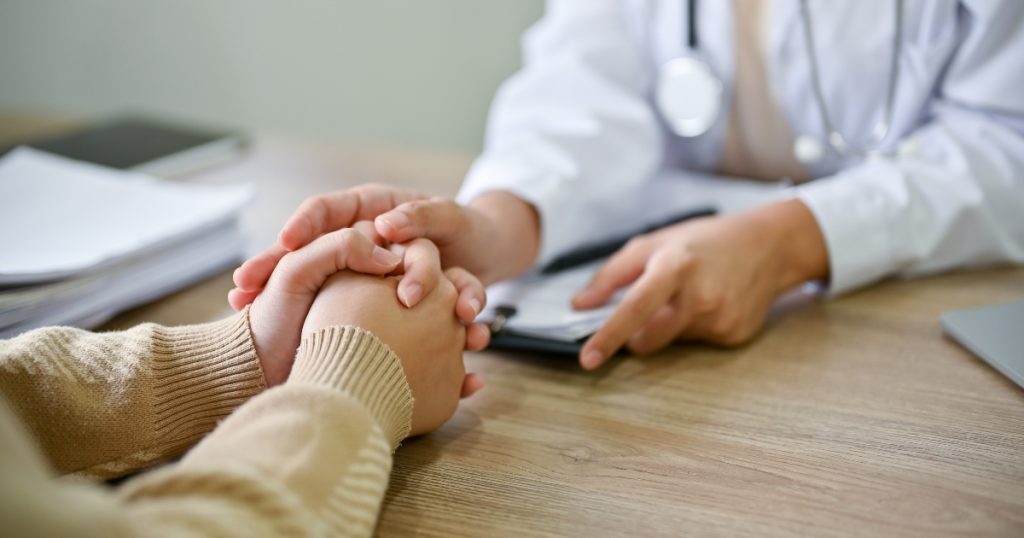
In an emergency, time is of the essence and every minute counts. Therefore, individuals experiencing symptoms of a hypertensive crisis should not hesitate to call emergency services or go to the nearest emergency room immediately. Timely action can significantly impact the outcome and ensure the best possible care and management of the situation.
Hypertensive Emergencies vs. Hypertensive Urgencies
Hypertensive emergencies are when high blood pressure spikes and can lead to organ damage. To prevent imminent organ damage, blood pressure must be reduced immediately.
Hypertensive urgency occurs when blood pressure spikes, but no damage is done to the body’s organs. It is possible to lower blood pressure safely within a few hours.
When to Seek Professional Help?
To determine the need for immediate treatment, assess the situation’s severity. Severe symptoms like intense chest pain, breathing difficulties can indicate a hypertensive emergency. In such cases, seek urgent help.
Elevated blood pressure without severe symptoms may be a hypertensive urgency, requiring prompt medical evaluation, usually managed in an outpatient or urgent care setting.
Prompt action is vital in emergencies to prevent life-threatening complications. Do not hesitate to seek emergency medical intervention for the best possible outcome.
Start managing your heart health now!
Find out what works for you with this 60sec quiz.

Blood Pressure Essentials
High blood pressure is when the force of blood flowing through your blood vessels is consistently too high.
Blood pressure is measured in millimeters of mercury (mmHg) and is expressed as 2 numbers: systolic pressure and diastolic pressure. For example, if a blood pressure reading is 120/80mmHg, the systolic blood pressure is 120mmHg, and the diastolic pressure is 80mmHg.
Systolic blood pressure: This is the higher number in a blood pressure reading and represents the force of blood flow against the arterial walls when the heart contracts and pumps blood out.
Diastolic blood pressure: This is the lower number in a blood pressure reading and represents the force of blood pushing against the arterial walls when the heart is at rest between beats.
Normal blood pressure levels are generally considered to be below 120/80mmHg.
Ways to Manage Blood Pressure Long-Term
Now that you know how to lower high blood pressure immediately, here are some tips to control high blood pressure long-term.
Stress management and lifestyle changes

Stress reduction techniques play a crucial role in controlling blood pressure. By adopting practices like deep breathing, meditation, or mindfulness, you can manage stress and promote relaxation, contributing to better blood pressure control.
Moreover, embracing healthier habits and lifestyle changes can have long-term benefits for maintaining normal blood pressure, including maintaining a balanced diet, limiting sodium intake, engaging in regular physical activity, managing weight, limiting alcohol consumption and caffeine intake, and quitting smoking.
Maintaining a heart-healthy diet
Maintaining a heart-healthy diet is crucial to reduce blood pressure. Follow a nutritional guide emphasizing potassium-rich foods, like bananas and leafy greens, as they help regulate blood pressure. Moderately enjoy dark chocolate, which is known for its potential blood pressure-lowering effects. Remember to monitor saturated fat intake, avoid processed foods, opt for lean proteins, and incorporate fruits, vegetables, and whole grains.
For more comprehensive guidance, try Cardi Health. Not only does it offer healthy, personalized meal plans, but it also provides valuable insights and resources to support your journey to a healthier heart.
Exercise for blood pressure management

Exercise is a powerful tool for blood pressure management, and regular physical activity helps lower blood pressure. Engaging in recommended exercise programs, such as aerobic activities, strength training, and flexibility exercises, can improve cardiovascular health and overall well-being.
It’s essential to consult with a healthcare provider before starting any exercise program, especially if you have pre-existing health conditions. By incorporating exercise into your lifestyle, you can effectively manage blood pressure and promote a healthier cardiovascular system.
Weight management and its impact
Weight management plays a significant role in improving blood pressure and overall heart health. Losing excess weight can help lower your blood pressure, reducing the strain on the cardiovascular system.
Here are some general tips to help you in your weight loss journey:
- Adopt a balanced diet
- Control your portions
- Read food labels
- Monitor calorie intake
- Engage in physical activity
Regular blood pressure monitoring
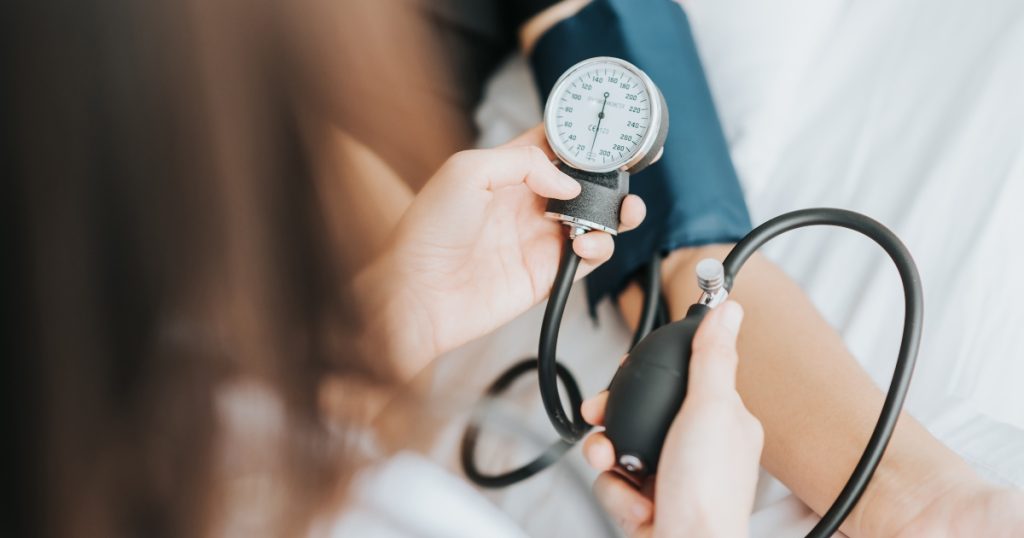
Regular blood pressure monitoring is essential for people with hypertension or those at risk of high blood pressure. Monitoring allows you to track changes in blood pressure readings over time, detect any potential issues, and make informed decisions about your health.
By using a reliable and accurate blood pressure monitor, such as Cardi Health’s, you can conveniently check your blood pressure at home. Cardi Health’s monitor offers ease of use and accuracy. It stores multiple blood pressure readings in itself and the application. This can be valuable for individuals who need to monitor their high blood pressure readings as part of their hypertension management plan.
Regular medical follow-ups
Regular visits to the doctor’s office are crucial for people with hypertension or those at risk of high blood pressure. These follow-up appointments with healthcare professionals, such as primary care physicians or cardiologists, are essential for effective blood pressure management and emergency treatments.
Blood Pressure Medication in Emergencies
Blood pressure medications play a crucial role in managing emergencies. During critical moments when blood pressure rises to dangerous levels, these medications can help lower your blood pressure and reduce the risk of severe complications like stroke, heart attack, or organ damage.
However, it’s essential to use caution and ensure professional medication administration during emergencies.
FAQ
What should I do if I experience a sudden spike in blood pressure and feel unwell?
If you experience a sudden increase in blood pressure and feel unwell, it’s essential to take immediate action. Sit down and rest in a comfortable position, practice deep breathing, and try to remain calm. If your symptoms persist or worsen, seek immediate medical attention promptly by calling emergency services or going to the nearest hospital.
What lifestyle changes can I make to prevent emergencies?
Adopting a heart-healthy lifestyle can help prevent emergencies. Focus on a balanced diet rich in fruits, vegetables, whole grains, and lean proteins. Engage in regular physical activity, manage stress through relaxation techniques, quit smoking, and reduce alcohol consumption.
Can stress and anxiety trigger a hypertensive emergency?
Yes, stress and anxiety can contribute to a sudden increase in blood pressure and potentially trigger an emergency.
Can I use over-the-counter medications to lower my blood pressure during an emergency?
No, it is not advisable to use over-the-counter medications to lower blood pressure during an emergency. Only use medications prescribed by a healthcare professional.
How does monitoring my blood pressure at home help?
Home monitoring allows you to track your readings over time, detect any potential issues, and make informed decisions about your health.
Start managing your heart health now!
Find out what works for you with this 60sec quiz.

Conclusion
Mastering blood pressure management techniques is essential for emergencies and overall health. Understanding the importance of monitoring blood pressure at home with the right equipment, recognizing signs of emergencies, managing stress, and making lifestyle changes can make a significant difference in preventing complications and promoting cardiovascular wellness.
By seeking professional guidance from a healthcare provider, you can take charge of your health and receive personalized advice and treatment plans. Regular medical follow-ups, proper medication use, and adherence to prescribed therapies are crucial in managing blood pressure effectively.
Related articles
Best Foods to Lower Cholesterol
Does Caffeine Raise Blood Pressure?
Does Drinking Water Lower Blood Pressure?
Causes of High Blood Pressure at Night
10 DASH Diet Breakfasts for a Healthy Start
Heart-Healthy Diet Guide
What Should an 85-Year-Old Blood Pressure Be?
What is Normal Blood Pressure for a 70-Year-Old?
How to Read Blood Pressure: A Comprehensive Guide
Manage your heart health now
Find out what works best for you with this 60sec quiz and get your personalized heart health plan.

